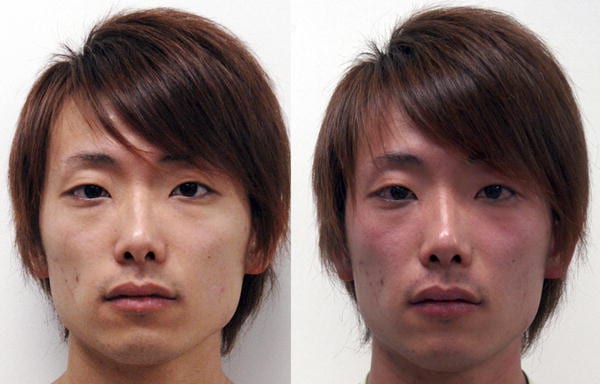
No matter what you call it — “flush”, “blush” or “glow” — the red face, nausea and rapid heart beat that many people with Asian ancestry experience when they drink alcohol is more than just a quirk of nature. Research shows it’s a significant risk factor for esophageal cancer, one of the deadliest malignancies in the world.
In a paper published online yesterday in PLoS Medicine, researchers from the National Institute on Alcohol Abuse and Alcoholism and Japan’s Kurihama Alcohol Center advise physicians that they need to ask their Asian patients about their experiences with alcohol in order to identify and counsel those who are at the highest risk.
In the body, alcohol is first converted into acetaldehyde, a potentially cancer-causing toxin, and then into a harmless substance called acetate. An enzyme called ALDH2 is responsible for the crucial detoxifying step. But a genetic variation known as ALDH2*2, most commonly found in people with Asian ancestry, can render the enzyme unable to convert acetaldehyde into acetate.
Having two copies of the ALDH2*2 variation means a person can’t break acetaldehyde down at all. Even a tiny amount of alcohol leads to a build up of the toxin and extremely unpleasant side effects, causing most of these people to avoid drinking altogether.
People with just one copy of ALDH2*2 flush when they drink alcohol too, but their bodies are able to process some acetaldehyde and their reactions are less severe. Some of these people build up a tolerance to acetaldehyde, allowing them to drink in substantial quantities. But while these people may think they’ve learned to deal with the annoyance of alcohol flushing, what they’ve really done is train themselves to ignore their bodies’ warning signals.
According to the authors, evidence from several studies has consistently linked alcohol consumption with the risk of esophageal cancer in people with one copy of ALDH2*2. Depending on the study, the odds of esophageal cancer are raised 3.7 to 18.1 times after taking into account the level of alcohol consumption. For heavy drinkers with one copy of ALDH2*2 the news is even worse: most studies show their odds of esophageal cancer are increased at least 10-fold.
(23andMe customers can see their data for ALDH2 and learn more about alcohol flushing in the trait report found here. Customers can also check their data at rs671 using the Browse Raw Data feature. Each A is a copy of ALDH2*2.)
The authors say that doctors should routinely question Asian patients about their reactions to alcohol and advise those who do flush to keep their drinking to a minimum. This simple step could have a real impact on esophageal cancer rates.
For example, the authors calculate that if Japanese males with one copy of ALDH2*2 who are moderate to heavy drinkers could be convinced to scale back to only light drinking, 53% of esophageal cancers in this population could be prevented.
“In view of the approximately 540 million ALDH2-deficient individuals in the world, many of whom now live in Western societies, even a small percent reduction in alcohol drinking would translate into a substantial number of lives saved,” the authors write.
Photo: doi:10.1371/journal.pmed.1000050.g001. From: Brooks PJ, Enoch MA, Goldman D, Li TK, Yokoyama A PLoS Medicine Vol. 6, No. 3, e50 doi:10.1371/journal.pmed.1000050